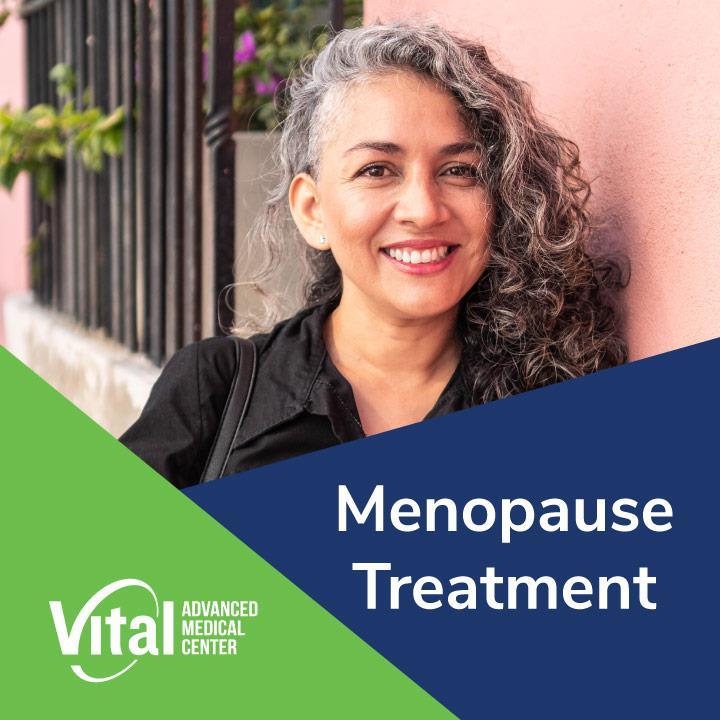COPING WITH MENOPAUSE

Women can seek treatment for menopause through a variety of approaches, depending on the severity of symptoms, health considerations, and personal preferences. The goal of menopause treatment is typically to manage symptoms like hot flashes, night sweats, mood changes, vaginal dryness, and disrupted sleep.
However, the lack of estrogen in the body during Menopause has many more consequences for a woman’s body. There are over 300 tissues that require estrogen, and are therefore affected by menopause. For example, bone. Many menopausal women are prone to osteoporosis, a disease that causes weak and brittle bones. So, think of Menopause as more than just annoying symptoms like hot flashes and night sweats.
What are the options available for coping with Menopause?
Hormone Replacement Therapy (HRT)
HRT is one of the most common treatments for menopausal symptoms, as it helps restore the hormones (estrogen and sometimes progesterone) that the body stops producing during menopause. Estrogen Therapy (ET) is used to treat symptoms related to low estrogen, such as hot flashes and vaginal dryness. Estrogen can be given in several forms such as Oral pills, Transdermal patches, Topical gels or creams, and Vaginal rings or creams (for vaginal dryness)
For women who still have their uterus, Combined Estrogen and Progesterone Therapy (EPT) is suggested. Progesterone is added to prevent the risk of endometrial cancer that can arise from unopposed estrogen.
HRT can be a highly effective treatment for menopausal symptoms, but it may have risks for some women (e.g., increased risk of blood clots, stroke, or breast cancer). The decision to use HRT should be made in consultation with a healthcare provider. At our center for Menopause Treatment in Tampa certified providers examine women who are approaching or in menopause to find out if Bioidentical Hormone Replacement Therapy, BHRT in Tampa is for them.
Non-Hormonal Medications
For women who cannot or prefer not to use HRT, non-hormonal treatments can also help manage menopause symptoms:
• Selective Serotonin Reuptake Inhibitors (SSRIs) or Selective Norepinephrine Reuptake Inhibitors (SNRIs): These are types of antidepressants that can help manage hot flashes and mood swings.
• Gabapentin: Originally used for nerve pain, gabapentin can also reduce hot flashes.
• Clonidine: This medication, typically used for high blood pressure, can also help with hot flashes in some women.
• Vaginal Estrogen: For vaginal dryness or discomfort during sex, vaginal estrogen creams, tablets, or rings can be used locally with fewer systemic effects.
Lifestyle Changes
Adopting healthy lifestyle habits can help alleviate menopause symptoms. Let’s begin with Diet. A well-balanced diet rich in calcium and vitamin D is essential to support bone health during menopause, as estrogen loss can lead to bone thinning (osteoporosis). Foods rich in phytoestrogens, like soy products, can also help balance hormones.
You must Exercise. Regular physical activity, including strength training and weight-bearing exercises, can reduce the risk of osteoporosis, improve mood, and help with weight management.
Try to reduce your stress with practices like yoga, meditation, and deep breathing. These can help manage the stress and anxiety that often accompany menopause.
Get adequate sleep. Improving sleep hygiene and creating a comfortable sleep environment can help alleviate night sweats and insomnia.
Vaginal Treatments
At our center for Menopause Treatment in Tampa , vaginal dryness and even pain during intercourse is one of the most frequent complaints from our menopausal patients. It inhibits having normal sexual relations.
For vaginal dryness or discomfort during intercourse, there are several treatment options such as Vaginal Moisturizers, which can provide long-lasting moisture and relieve vaginal dryness, Vaginal Lubricants, which when used during intercourse, can reduce discomfort.
Lastly, there is vaginal estrogen, which as mentioned earlier, can be applied directly to the vaginal area can help restore moisture and elasticity, reducing dryness and discomfort.
Bone Health Support
Since menopause increases the risk of osteoporosis, managing bone health becomes a key part of treatment. Calcium and Vitamin D Supplements can help support bone strength. Bisphosphonates or other osteoporosis medications may be recommended by doctors to prevent or treat bone loss.
Psychological and Emotional Support
Menopause can have emotional effects, and women may experience mood swings, irritability, or anxiety. Psychological support through therapy, counseling, or support groups can help women cope with the emotional challenges of menopause.
